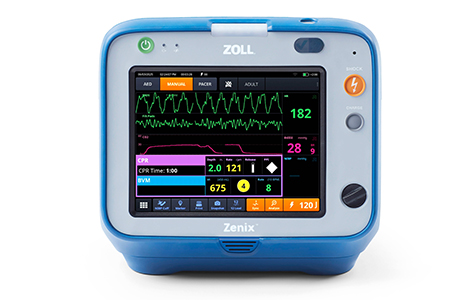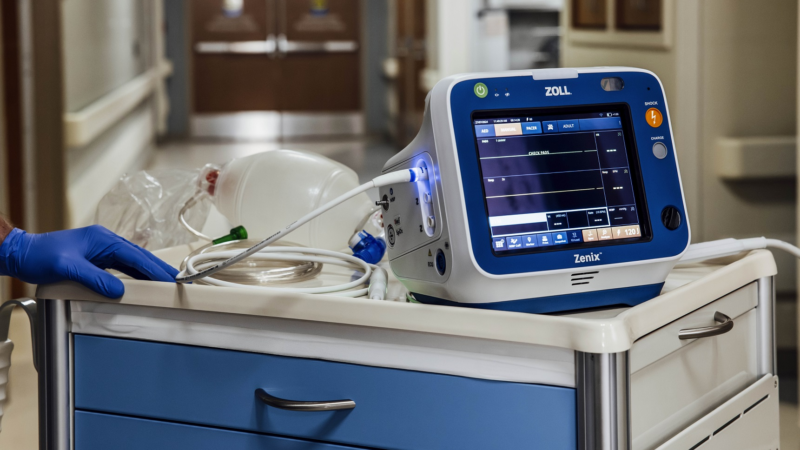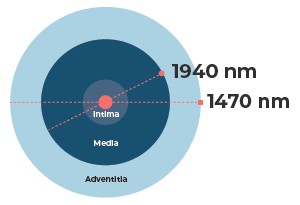biolitec’s photosensitizer Foscan has unimagined potential against SARS-CoV-2 – Virtual screening shows Temoporfin among other substances as a promising inhibitor of Corona envelope protein
Jena, 12th October 2020 – Research is currently being conducted worldwide to find a drug against the pathogen causing the Corona pandemic. Two studies have shown good potential for Temoporfin. Temoporfin is the active ingredient of the drug Foscan® from biolitec Pharma Ltd. in Jena. The research group around Anatoly Chernyshev searched by computer modeling for a blocker against the envelope protein of the SARS-CoV-2 virus, also called E-protein. The E-protein is the binding site for attachment to the host cell. This leads to overreactions of the immune system. Temoporfin proved to be an extremely promising inhibitor of this process among 6,000 investigated substances. Anatoly Chernyshev recommends Temoporfin for further preclinical studies.
A research team in Istanbul took a different approach: they used computer simulation to search for inhibitors of the most important protease of the SARS-CoV-2 virus. The virus uses this protease to cleave the proteins of the host cell. This is an immensely important process for the virus and the disease process. Temoporfin proved to be one of the 100 most promising substances among 7922 substances investigated.
Both studies have been placed online as pre-publications on a pre-print server (ChemRxiv). Temoporfin appears to potentially inhibit two important and independent processes of the SARS-CoV-2 virus. Therefore, these new findings on the active ingredient Temoporfin are of great importance. They should absolutely induce researchers to examine the mode of action of Temoporfin on SARS-CoV-2 more closely. These new findings are a chance discovery, because actually the drug has a completely different purpose: As a photosensitizer (light-sensitive substance) it is used in photodynamic therapy (PDT), which is now also established as a recognized cancer treatment. In this therapeutic procedure, a photosensitizer (e.g. Foscan®) reacts when irradiated with light and produces singlet oxygen, which among other things destroys cancer cells.
However, the process has also proved extremely effective with microorganisms such as viruses. A scientific paper deals with antimicrobial photodynamic therapy (aPDT) as a tool to control COVID-19. Currently, there is no antidote or vaccine available and since SARS-CoV-2 has mutation potential, a vaccine could be ineffective after some time. Studies have shown that aPDT is as effective against drug-resistant germs as it is against non-resistant ones. In addition, the paper points out that it is possible to add a photosensitizer to surfaces, textiles and even sewage systems and to let it react with artificial white light or even sunlight to disinfect the objects. Of course, these approaches and observations are very new and require even more intensive research. Overall, clinical and preclinical studies would be promising and useful.
Sources:
1)Anatoly Chernyshev: Pharmaceutical Targeting the Envelope Protein of SARS-CoV-2: the Screening for Inhibitors in Approved Drugs. Cambridge (Neuseeland) 2020; https://chemrxiv.org/articles/preprint/Pharmaceutical_Targeting_the_Envelope_Protein_of_SARS-CoV-2_the_Screening_for_Inhibitors_in_Approved_Drugs/12286421/1
2)Serdar Durdagi, Busecan Aksoydan, Berna Dogan, Kader Sahin, Aida Shahraki: Screening of Clinically Approved and Investigation Drugs as Potential Inhibitors of COVID-19 Main Protease: A Virtual Drug Repurposing Study. Istanbul (Türkei) 2020; https://chemrxiv.org/articles/Screening_of_Clinically_Approved_and_Investigation_Drugs_as_Potential_Inhibitors_of_COVID-19_Main_Protease_A_Virtual_Drug_Repurposing_Study/12032712
3)Adelaide Almeida, M. Amparo, F. Faustino, Maria G. P. M. S. Neves: Antimicrobial Photodynamic Therapy in the Control of COVID-19. Aveiro (Portugal) 2020; https://www.mdpi.com/2079-6382/9/6/320/htm
biolitec® is one of the world’s leading medical technology companies in the field of minimally invasive laser applications and is offering in the field of photodynamic therapy (PDT) the laser-assisted treatment of cancer with the drug Foscan®, registered in the EU. Since 1999, biolitec® is focused on the development of minimally invasive, gentle laser procedures. The unique LEONARDO® diode laser from biolitec® is the first universally applicable medical laser with a combination of two wavelengths, 980 nm and 1470 nm, which can be used in all disciplines. ELVeS® Radial® (ELVeS® = Endo Laser Vein System) is the world’s most common laser system for treating venous insufficiency. In proctology, biolitec® offers a maximum sphincter-sparing therapy for anal fistulas as well as treatment options for hemorrhoids and pilonidal cysts. In urology, the range of therapies has expanded from benign prostate hyperplasia (BPH) to bladder and prostate tumors. The LEONARDO® Mini laser, which weighs only 900 g, has been specially developed for mobile applications. Gentle laser applications in the fields of gynecology, ENT, thoracic surgery and pneumology, esthetics, and orthopedics are also part of biolitec®’s business field. Further information is available at www.biolitec.com
Company-Contact
biolitec AG
Joern Gleisner
Untere Viaduktgasse 6/9
1030 Wien
Phone: +49 (0) 3641 / 51953-36
Fax: +49 (0) 6172 / 27159-69
E-Mail: info@biolitec.de
Url: http://www.biolitec.com
Press
biolitec
Joern Gleisner
Otto-Schott-Str. 15
07745 Jena
Phone: +49 (0) 3641 / 51953-36
Fax: +49 (0) 6172 / 27159-69
E-Mail: joern.gleisner@biolitec.com
Url: http://www.biolitec.com
Bildquelle: biolitec AG







